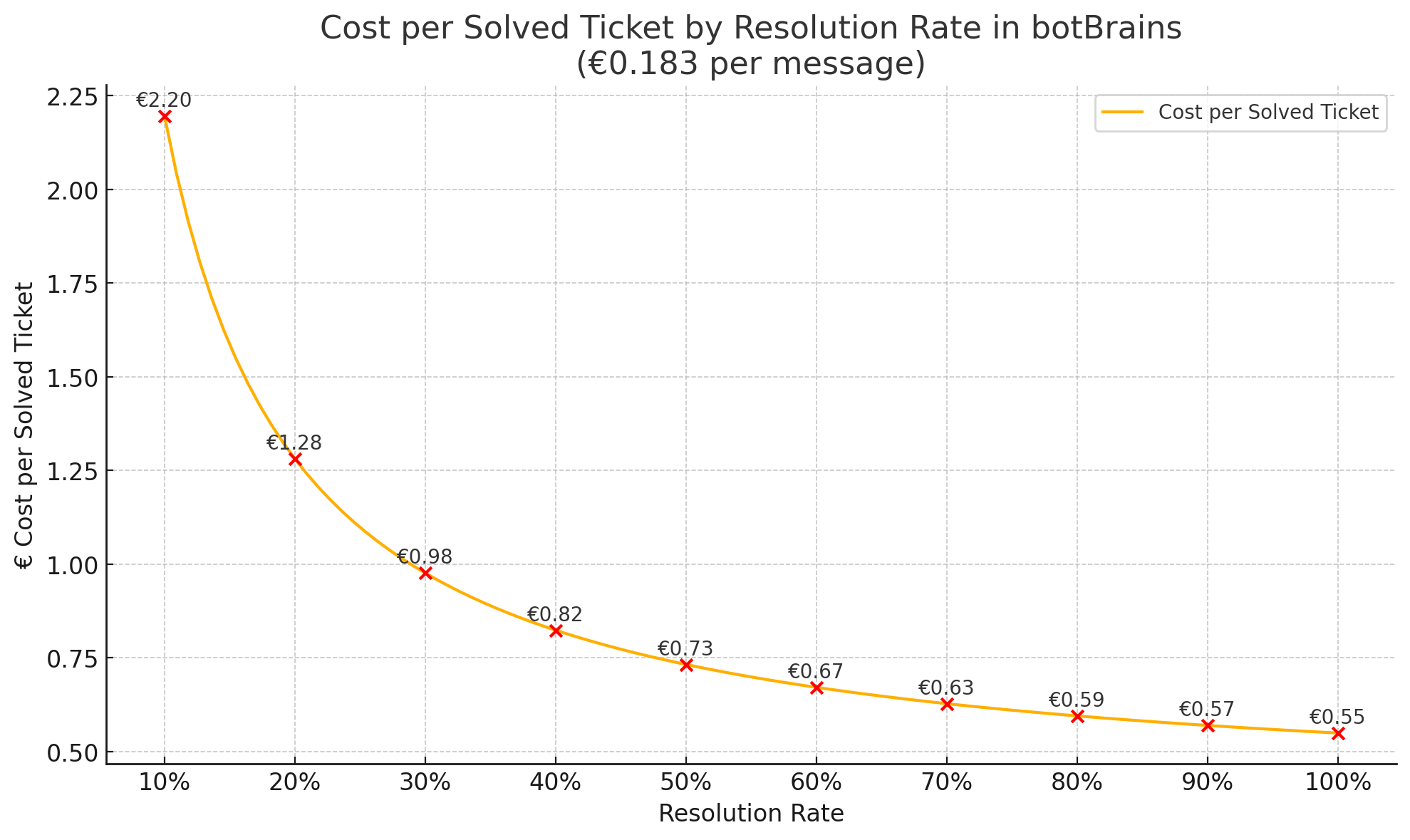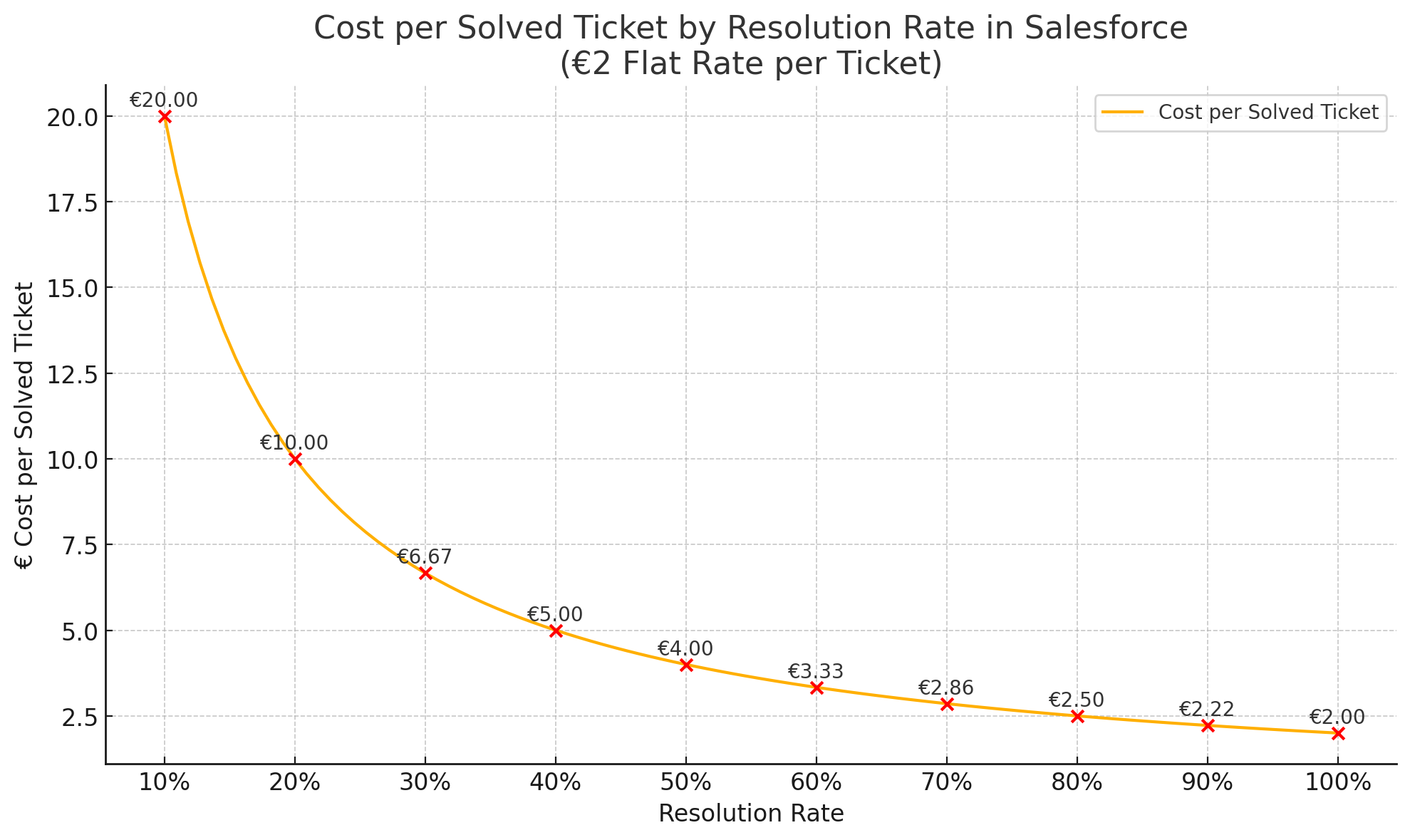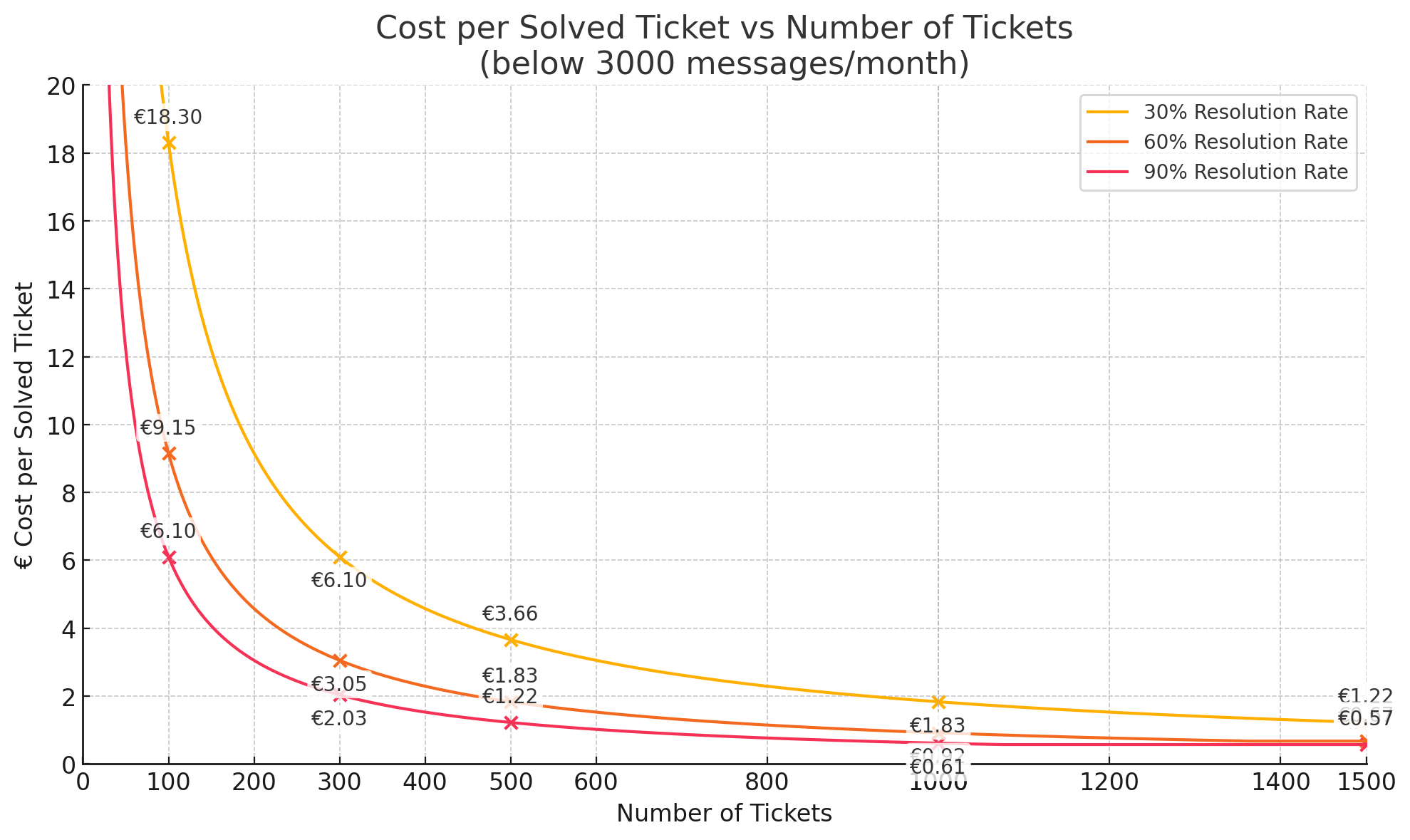botBrains for Salesforce Service Cloud

Many teams have successfully moved their support operations to Salesforce Service Cloud. But when it comes to AI, built-in offerings like Einstein and Agentforce are too immature for great customer service. botBrains is the AI front door that customers love. Clear ROI, no migrations, no retraining - just fast, accurate support your customers expect, all well integrated into your existing Salesforce ecosystem.
Liam van der Viven
Co-Founder & CTO at botBrains
Why AI in customer service?
AI unlocks a self reinforcing support flywheel: chatbots that stay online 24/7 resolve routine questions with unbeatable time-to-resolution, escalating proactively for an ideal customer experience. Deflection earns teams time to improve documentation, which will result in fewer escalations. Tracking these escalations offers insights into topics that still require human involvement, enabling both prioritization of documentation efforts and clear ROI of integrations with e.g., an ERP or CRM. Additional capabilities will increase the deflection rate, thus earning your team more time to focus on other initiatives and reduce costs, a self-perpetuating flywheel. The result is happier customers, fewer tickets, and lower costs without adding headcount. Many enterprises run on Salesforce Service Cloud, let's see what they offer and whether botBrains might be a better option for you.
Executive Summary
Salesforce is uniquely positioned with existing data in their systems and robust permission setups to create knowledge-rich, well-integrated AI experiences. Their vision of native Einstein Bots and Agentforce aims to leverage this advantage to deliver seamless customer service automation within their ecosystem.
However, the current reality falls short: As of Q2 2025, early adopters report persistent reliability problems with Salesforce's AI solutions, including alarming reports of every 2 in 5 interactions resulting in malfunctions during live customer conversations. These issues have significantly slowed adoption across the Salesforce ecosystem, with many projects delayed for months or stalled entirely. The limited scope of at most 10-40% resolution rate with Einstein Bots additionally frustrates the remaining 60% of customers, forcing them to navigate yet another ineffective touchpoint before reaching a human agent. This unnecessary friction hurts loyalty and how valued customers feel by your brand. The limited adoption also reflects the few integrators available to connect your Systems, beside the experience needed with MuleSoft. Adding to these challenges, the conversation pricing structure is prohibitively expensive at $2 per 24h per conversation.
botBrains solves these critical challenges:
- Works immediately: Production-ready in hours versus Salesforce's weeks or months
- Delivers results: Proven 70-90% ticket resolution versus Einstein's 10-40% resolution rate and Agentforce's complete lack of evidence for customer service success. Part of that is botBrains' built-in support for proper product advisory
- Costs less: Transparent €549/month base platform price versus Salesforce's unpredictable per-conversation model
- Zero maintenance: Continuous automatic knowledge sync versus Salesforce's manual updates
- No expertise needed: Dedicated Success Managers, usually the founders, will guide you through the onboarding and consult on which workflows to automate. Deploy without LLM specialists versus Agentforce's steep learning curve
Enhance your customer experience immediately while protecting your Salesforce investment. botBrains integrates seamlessly with your existing Service Cloud infrastructure, delivering an AI front door that works reliably from day one, strengthening customer trust and significantly reducing operational costs.
Knowledge: the backbone of reliable chatbots
A chatbot can only be as useful as the information it can draw from. Salesforce calls this the "Trust Layer".
| Capability | Einstein Bots | Agentforce | botBrains |
|---|---|---|---|
| Unstructured sources (web pages, PDFs, blogs, Confluence, Notion…) | Crawls only Salesforce Knowledge articles. External documents must be copied or rebuilt. | Early pilot of Bring Your Own knowledge and embeddings. Limited in size, manual and capped. | Native loaders for HTML, Markdown, PDF, Docx, audio transcripts and more than 20,000 objects per workspace. Continuous background refresh. |
| Structured data or API lookups (ERP, CRM, OMS…) | Requires custom Apex or middleware; no data fetch at runtime out of the box. | Promised through Flow Actions and Apex, but each action must be hand coded and does not scale well. | No code action templates with secure OAuth. Real time product, order or policy checks during the chat. |
| Source freshness | Manual article publishing and version limits. | Manual refresh; no automatic crawl. | Continuous sync, delta indexing, zero downtime. |
| Citation and traceability | Article link only. | Not available yet. | Links to sources. |
Bottom line: Salesforce's native tools were designed around a closed Knowledge Base. Most customers, however, expect answers that span websites, policy PDFs, logistics APIs and ERP data, areas where botBrains already excels.
botBrains continuously reindexes every connected source. Each page or file is refreshed every twenty-four hours, so your team never needs to update content twice. Higher refresh rates are possible, but usually indicate other indexing options we want to pursue.
Time to Market
Issues with Einstein, Agentforce
Reliability gaps present significant challenges for Salesforce's native AI solutions. Early adopters consistently report buggy demonstrations, frustrating agent loops, and fragile prompt chains that ultimately stall projects. These technical inconsistencies create uncertainty and delay implementation timelines, preventing teams from achieving quick wins. Actually, while writing this article, we used the version available here, and it failed to generate a reply, stuck in loading. After 5 minutes, a peak into the chrome developer console revealed a failed request. Unhandled errors are not considered particularly user-friendly, and the lack of a fallback to a human agent is worrying. Industry analysis confirms this trend, with SalesforceBen reporting that Agentforce adoption is slower than expected due to these implementation hurdles.
Missing know-how compounds implementation difficulties across organizations. Most Service Cloud teams have never successfully shipped an LLM project, leaving them unprepared for the unique challenges of conversational AI. Salesforce's internal enablement resources remain patchy and fragmented, forcing teams to learn critical implementation skills through costly trial and error.
Drift analysis costs extra. LLM based systems don't crash, they drift in behaviour. For Salesforce users seeking to maintain quality over time, detecting quality decay requires additional investments in Einstein Copilot Analytics or third-party observability tools. These necessary additions introduce unexpected license and integration costs that can significantly impact the total cost of ownership.
The botBrains edge
ROI first advisory sets botBrains apart from competitors. Dedicated success managers, often including the company's founders themselves, work directly with clients to model robust business cases, identify quick-win deflection opportunities, and benchmark automation rates against industry standards. This consultative approach ensures implementations focus on measurable business outcomes from day one. botBrains platform is also built from the ground up to provide Insights into conversations with metrics and TopicAI. Evaluations are also available via Test Suites to detect and fight drift in behaviour.
Fast setup accelerates time to value with botBrains. Their streamlined process provides guided onboarding in just one hour, with production pilots typically launching in under two weeks. Customers only need to provide the authorization details and provide feedback on behavior in the first few weeks. This rapid deployment is possible thanks to prefabricated Salesforce connectors that eliminate the need for extensive custom development, allowing teams to demonstrate value before the next budget cycle.
Affordable integrations remove a major barrier to comprehensive automation. When organizations need custom connections like ERP lookups, botBrains' integration studio delivers fixed-price connectors that typically cost less than a single month of Agentforce seats. This predictable pricing model enables teams to extend their AI capabilities without fear of spiraling integration costs.
Transparent Pricing That Makes Sense
Salesforce's pricing model for AI can be difficult to predict: $2 per conversation per day or $75 per employee user quickly adds up to thousands in monthly costs with uncertain ROI.
botBrains offers a fundamentally different approach:
- Base platform charge of €549/month includes 3,000 AI responses. The base platform price includes Single-Sign-On unlimited users.
- Most tickets are solved latest with 3 touches, so this is easily able to cover 1,000+ support tickets monthly, for single touch up to 3000 tickets per month. Overages are charged linearly to your current base price divided by the provisioned capacity per month.
- New Integrations for any external system like ERP, CRM or order management can be developed and are charged once upfront to cover development costs. The number of developer days are pre-agreed.
- Integrations will be charged as an additional base platform line item. This covers costs for hosting, maintenance and support of the integration. This is extremely cost effective compared to the increased resolution-rate by the AI.
This transparent model ensures you can accurately forecast costs and confidently measure ROI. No surprise charges, no hidden fees, just predictable pricing aligned with actual business value.
A CFO Example
Unpredictable pricing is one of the key challenges with Salesforce’s AI offerings. According to this article, Agentforce operates on a consumption-based model that charges €2 per conversation. In addition, users must pay for Einstein Requests, data storage, and sandbox usage.
There is also a minimum purchase of 10,000 conversations at a base rate of €2 each. Any usage beyond that is charged at €2.50 per conversation. For the purpose of this comparison, we will assume perfect usage planning and rely on the baseline €2 per conversation per 24 hours. While Salesforce includes 1,000 free conversations per month, we will ignore that figure to give a more realistic picture of ongoing costs. This is reasonable because we are also leaving out several other costs, such as data storage, sandbox environments, and Einstein API requests.
Cost per solved ticket
In contrast to Salesforce, botBrains charges per AI message rather than per conversation. For this comparison, we assume that most tickets are resolved with three AI-generated responses. This is a conservative estimate. In many e-commerce scenarios, approximately 70 percent of tickets are resolved during the first customer interaction, and industry data shows an average of 2.5 messages per ticket. For tickets that botBrains cannot resolve, typically only one message is sent before escalating to a human agent. We will thus say that
- solved tickets require 3 messages on average
- escalated tickets require 1 message on average
- cost per message is €0.183 at full usage of the botBrains base plan (
€549/3,000)
Calculating the cost per resolved ticket is the best metric to derive the return on investment.
avg_messages_per_solved_ticket =
(resolution_rate * 3 + (1 - resolution_rate) * 1) / resolution_rate
avg_cost_per_solved_ticket =
avg_messages_per_solved_ticket * €0.183
The result is illustrated in this chart:

For Salesforce, assuming a 40 percent resolution rate, the cost per solved ticket comes out to €5:

The cost of Salesforce lower resolution rate really shows in the cost per solved ticket. Even if both systems operate at the same resolution rate, botBrains is between 4x to 10x cheaper, and this does not even count in the operational efficencies though automatic source refresh and other features that botBrains provides.
All of the above charts help you decide if botBrains is the right solution for you, simply by calculating the cost you can accept for a solved ticket. Some tickets are harder to solve than others, so for simplicity, lets take the average output of a human agent paid the average salary. For full time (40h/week, 5 days per week) agents in Germany, the total cost of employment is roughly 122% of their brutto salary. This includes taxes, social security and other costs. The salaries of customer support agents in Germany is between €21,000 and €42,000, on average €29,000 per year. The total cost of employment makes this €35,000 or €2,900 per month.
| Tickets solved per day | Tickets solved per month | Total Cost of Employment | Cost per Solved Ticket |
|---|---|---|---|
| 100 | 2,000 | €2,900 | €1.45 |
| 50 | 1,000 | €2,900 | €2.90 |
| 20 | 400 | €2,900 | €7.25 |
Most agents will solve up to 50 tickets per day. The mean price for a solved ticket is €2.90.
The return on investment will be positive if the cost per solved ticket is below €2.90.
The additional beauty of botBrains is that scaling or high fluctuations in ticket volume are handled automatically with overages, allowing easy scaleup of the system in high-seasons around November, December and January.
For Smaller Teams (Fewer Than 1,000 Tickets per Month)
The smallest botBrains plan covers 3,000 messages. If your organization handles fewer messages than that, the price relative price increases, because there is a fewer number of messages to distribute the price around. The following chart shows how this plays out across different monthly ticket volumes and resolution rates:

How to read this: Take the cost per solved ticket via your teammate, then imagine a horizontal line at the y-axis, e. g. €2.90. The point where the line intersects the curve is the point after which the botBrains solution is cheaper than your agents.
As you can see, at 300 tickets (10 per day) and at least 60% resolution rate, we are more already more cost effective than an agent. As soon as you have more than 600 tickets per month, even at a very conservative resolution rate of 30%, we are cheaper than an agent.
Quick scorecard
| Criterion | botBrains | Einstein Bots | Agentforce |
|---|---|---|---|
| Setup to first reply | Few hours | One day | Weeks |
| Setup to production ready | Few hours | Few weeks | Months |
| Ticket deflection | 70-90% with LLM-driven responses | 10-40% with scripted flows | No evidence |
| Cost predictability | Fixed monthly fee (€549/month base platform price) + pay-as-you-go | $2 per conversation per 24h + Storage Fees + "Einstein Requests" | $2 per conversation per 24h + $75 per employee user |
| Implementation risk | Low - works alongside existing systems | Medium - requires extensive configuration | High - early adopters report reliability issues |
| Knowledge coverage | Website, Confluence, PDF, Docx, PPTX and more | Knowledge Base articles only | Limited external sources with manual updates |
| Knowledge maintenance | Continuous automatic sync | Manual | Manual |
| Live actions | Integrated & Managed by us with clear ROI | Custom Apex development required | Flow or Apex with extensive coding, unclear who and how much |
| Hosting and GDPR | European Union (Germany) | US or EU | No guarantees for LLMs |
| Org's LLM Expertise Required | None | Little | A lot |
Bottom line: For organizations prioritizing production-ready reliability and high automation rates, botBrains emerges as the superior partner. While Einstein Bots offers quick initial setup and Agentforce promises future capabilities, only botBrains delivers enterprise-grade automation with minimal implementation time, maximum knowledge coverage, and proven 70-90% ticket deflection—all without requiring specialized LLM expertise or extensive configuration work.
Salesforce Service Cloud + botBrains: The Perfect Integration
The combination of Salesforce Service Cloud and botBrains creates an optimal support environment that maximizes both platforms' strengths:
Zero switching costs for agents. Agents continue working entirely within the familiar Salesforce interface. botBrains operates as an intelligent front door, only creating tickets when human expertise is required.
Low-risk implementation. Start with botBrains generating private notes for agent review. As confidence builds, progress to public automation. This measured approach creates a safe environment where leadership can verify quality before expanding automation.
Cross-system intelligence without complexity. botBrains simultaneously accesses information from Salesforce, websites, knowledge bases, ERP systems, and more. This eliminates the traditional challenge where agents toggle between multiple systems, without requiring expensive middleware.
Clear ROI visibility. botBrains collects metrics, Salesforce collects metrics. Teams can easily track deflection rates, conversation quality, and customer satisfaction, making it straightforward to quantify cost savings.
Future-proof architecture. As Salesforce evolves its native AI capabilities, the botBrains integration remains complementary rather than competitive. Organizations can adopt new Salesforce features when they mature while maintaining the consistent, high-quality automation layer that botBrains provides today.
Implementation Timeline: From Decision to ROI in 15 Days
Note: Timeline reflects calendar days, not active work hours. Most of the time is needed to allow customers to create inquiries and using that to judge the AI answer quality. Custom integrations can prolong the number of days.
| Timeline | Implementation Milestone |
|---|---|
| Day 0 | Contract signed with conditional opt-out period. Connect botBrains to publicly available knowledge base and help documentation. Immediate demo with live data. |
| Day 1 | Add proprietary knowledge from private sources. Authorize botBrains for necessary 3rd party systems. Setup private-note mode inside Salesforce where agents can review and vet AI-generated answers. |
| Days 2-14 | Collect feedback from actual customer inquiries. Refine knowledge base while agents validate AI responses. Make continuous improvements without customer-facing risk. |
| Day 15 | Turn off private-note mode for well-established topics with proven high accuracy. Begin measuring actual ticket resolution and ROI. |
| Days 15+ | Monitor performance with integrated analytics. Opt-out period concludes after pre-agreed operational timeframe. |
botBrains resolves tickets on your website and in Service Cloud, reassigning the ticket when needed. This phased approach proved valuable for quality control while iterating fast to delivering rapid time-to-value.
Conclusion
Agentforce may eventually mature into a dependable, autonomous teammate, but today Service Cloud leaders need an AI front door that works this quarter. botBrains delivers that outcome: broader knowledge, easy setup, faster time to value and clear economics, while your agents remain exactly where they are, in Salesforce.